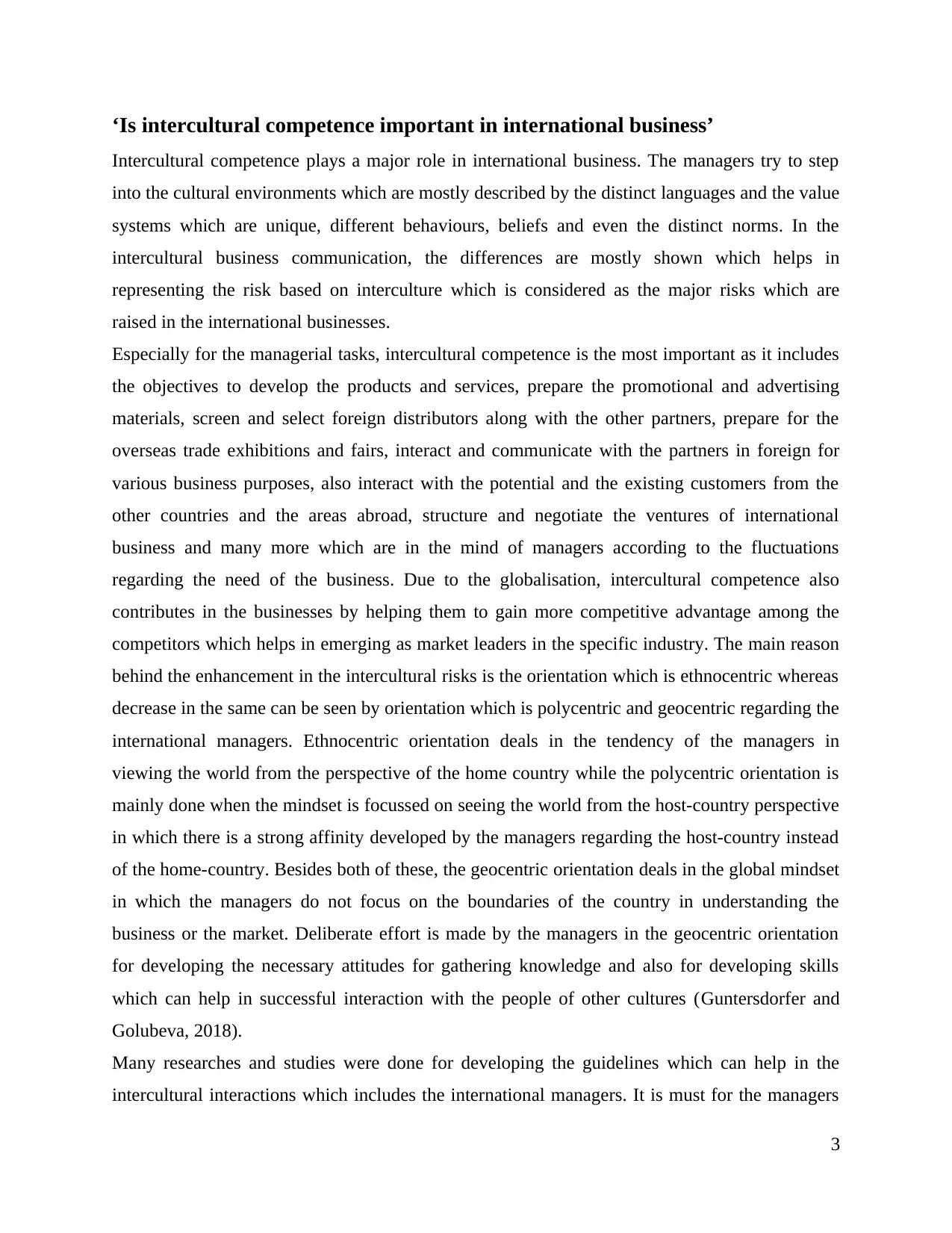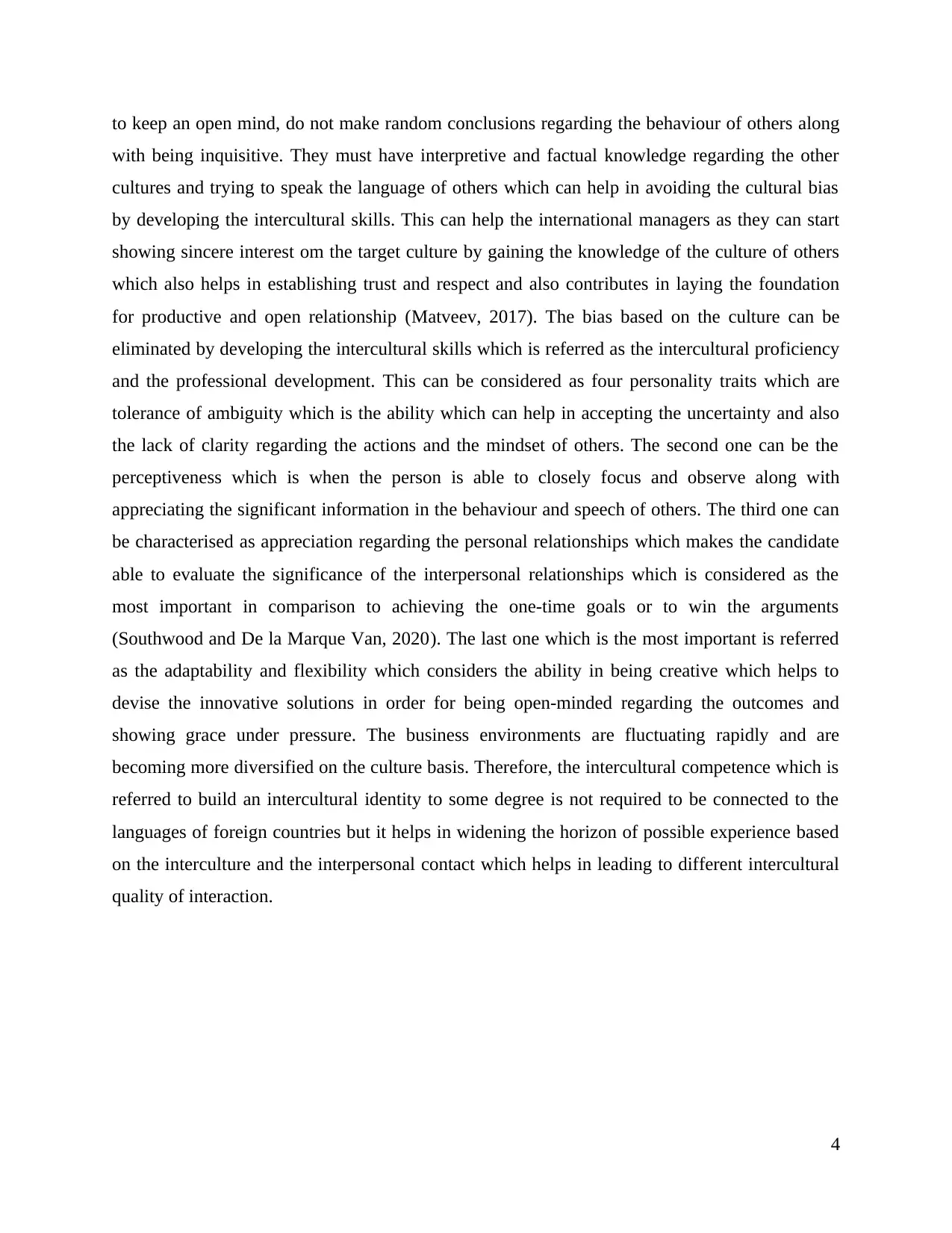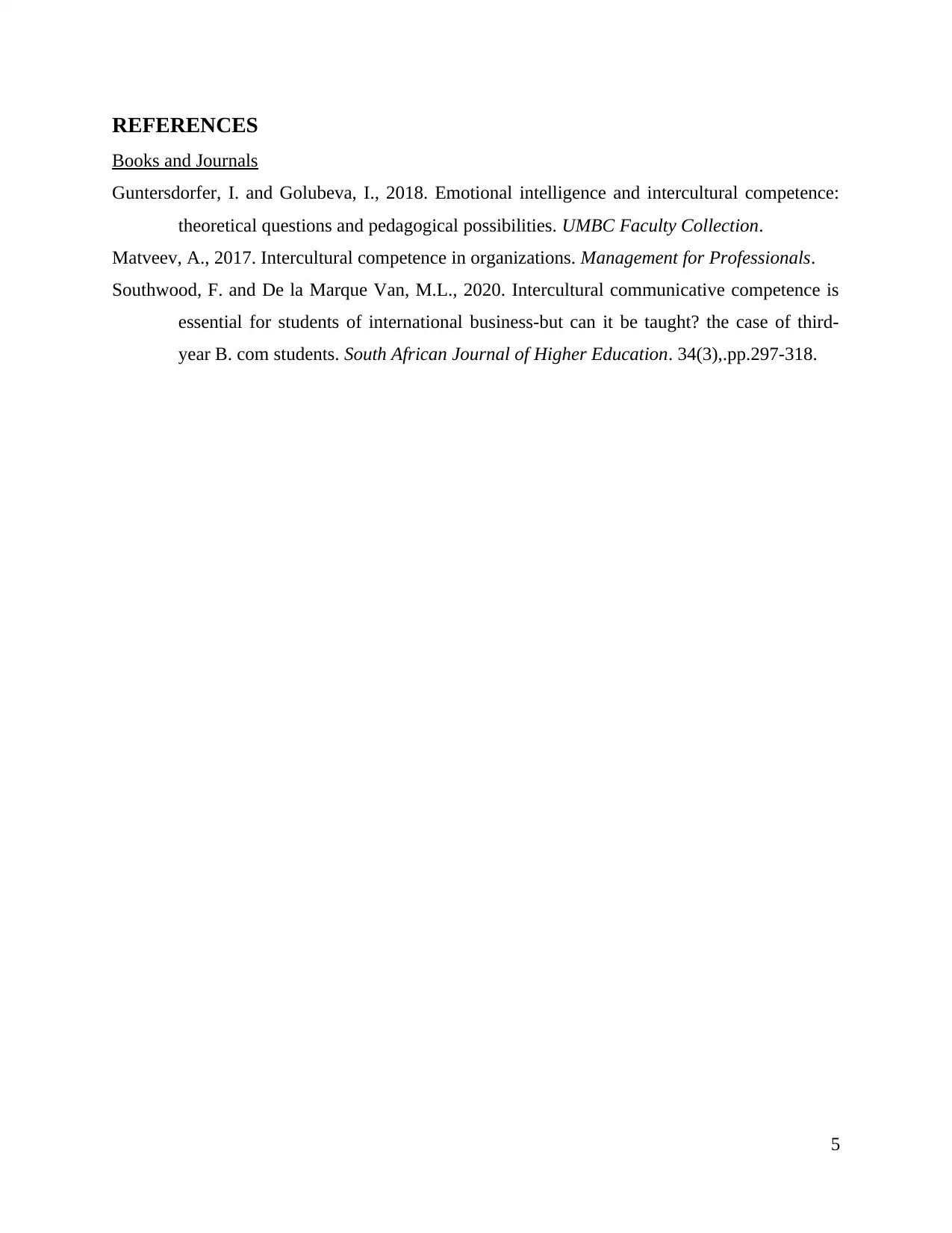EAP Assignment: Analyzing Intercultural Competence in Business
VerifiedAdded on 2023/01/03
|6
|932
|48
Essay
AI Summary
This essay examines the critical role of intercultural competence in international business. It highlights the significance of understanding cultural differences, communication styles, and value systems for successful global operations. The essay discusses how intercultural competence impacts managerial tasks, such as product development, marketing, and partner selection. It explores the influence of globalization and how intercultural competence contributes to a competitive advantage. The essay contrasts ethnocentric, polycentric, and geocentric orientations, emphasizing the need for managers to develop open-mindedness, interpretive knowledge, and intercultural skills. Furthermore, it outlines key personality traits like tolerance of ambiguity, perceptiveness, appreciation of personal relationships, and adaptability, crucial for navigating diverse business environments and fostering productive relationships. The essay concludes by emphasizing the importance of building intercultural identity and widening horizons through intercultural interactions.

ENGLISH FOR ACADEMIC
PURPOSES
PURPOSES
Paraphrase This Document
Need a fresh take? Get an instant paraphrase of this document with our AI Paraphraser

TABLE OF CONTENTS
‘Is intercultural competence important in international business’...................................................3
REFERENCES................................................................................................................................5
‘Is intercultural competence important in international business’...................................................3
REFERENCES................................................................................................................................5

‘Is intercultural competence important in international business’
Intercultural competence plays a major role in international business. The managers try to step
into the cultural environments which are mostly described by the distinct languages and the value
systems which are unique, different behaviours, beliefs and even the distinct norms. In the
intercultural business communication, the differences are mostly shown which helps in
representing the risk based on interculture which is considered as the major risks which are
raised in the international businesses.
Especially for the managerial tasks, intercultural competence is the most important as it includes
the objectives to develop the products and services, prepare the promotional and advertising
materials, screen and select foreign distributors along with the other partners, prepare for the
overseas trade exhibitions and fairs, interact and communicate with the partners in foreign for
various business purposes, also interact with the potential and the existing customers from the
other countries and the areas abroad, structure and negotiate the ventures of international
business and many more which are in the mind of managers according to the fluctuations
regarding the need of the business. Due to the globalisation, intercultural competence also
contributes in the businesses by helping them to gain more competitive advantage among the
competitors which helps in emerging as market leaders in the specific industry. The main reason
behind the enhancement in the intercultural risks is the orientation which is ethnocentric whereas
decrease in the same can be seen by orientation which is polycentric and geocentric regarding the
international managers. Ethnocentric orientation deals in the tendency of the managers in
viewing the world from the perspective of the home country while the polycentric orientation is
mainly done when the mindset is focussed on seeing the world from the host-country perspective
in which there is a strong affinity developed by the managers regarding the host-country instead
of the home-country. Besides both of these, the geocentric orientation deals in the global mindset
in which the managers do not focus on the boundaries of the country in understanding the
business or the market. Deliberate effort is made by the managers in the geocentric orientation
for developing the necessary attitudes for gathering knowledge and also for developing skills
which can help in successful interaction with the people of other cultures (Guntersdorfer and
Golubeva, 2018).
Many researches and studies were done for developing the guidelines which can help in the
intercultural interactions which includes the international managers. It is must for the managers
3
Intercultural competence plays a major role in international business. The managers try to step
into the cultural environments which are mostly described by the distinct languages and the value
systems which are unique, different behaviours, beliefs and even the distinct norms. In the
intercultural business communication, the differences are mostly shown which helps in
representing the risk based on interculture which is considered as the major risks which are
raised in the international businesses.
Especially for the managerial tasks, intercultural competence is the most important as it includes
the objectives to develop the products and services, prepare the promotional and advertising
materials, screen and select foreign distributors along with the other partners, prepare for the
overseas trade exhibitions and fairs, interact and communicate with the partners in foreign for
various business purposes, also interact with the potential and the existing customers from the
other countries and the areas abroad, structure and negotiate the ventures of international
business and many more which are in the mind of managers according to the fluctuations
regarding the need of the business. Due to the globalisation, intercultural competence also
contributes in the businesses by helping them to gain more competitive advantage among the
competitors which helps in emerging as market leaders in the specific industry. The main reason
behind the enhancement in the intercultural risks is the orientation which is ethnocentric whereas
decrease in the same can be seen by orientation which is polycentric and geocentric regarding the
international managers. Ethnocentric orientation deals in the tendency of the managers in
viewing the world from the perspective of the home country while the polycentric orientation is
mainly done when the mindset is focussed on seeing the world from the host-country perspective
in which there is a strong affinity developed by the managers regarding the host-country instead
of the home-country. Besides both of these, the geocentric orientation deals in the global mindset
in which the managers do not focus on the boundaries of the country in understanding the
business or the market. Deliberate effort is made by the managers in the geocentric orientation
for developing the necessary attitudes for gathering knowledge and also for developing skills
which can help in successful interaction with the people of other cultures (Guntersdorfer and
Golubeva, 2018).
Many researches and studies were done for developing the guidelines which can help in the
intercultural interactions which includes the international managers. It is must for the managers
3
⊘ This is a preview!⊘
Do you want full access?
Subscribe today to unlock all pages.

Trusted by 1+ million students worldwide

to keep an open mind, do not make random conclusions regarding the behaviour of others along
with being inquisitive. They must have interpretive and factual knowledge regarding the other
cultures and trying to speak the language of others which can help in avoiding the cultural bias
by developing the intercultural skills. This can help the international managers as they can start
showing sincere interest om the target culture by gaining the knowledge of the culture of others
which also helps in establishing trust and respect and also contributes in laying the foundation
for productive and open relationship (Matveev, 2017). The bias based on the culture can be
eliminated by developing the intercultural skills which is referred as the intercultural proficiency
and the professional development. This can be considered as four personality traits which are
tolerance of ambiguity which is the ability which can help in accepting the uncertainty and also
the lack of clarity regarding the actions and the mindset of others. The second one can be the
perceptiveness which is when the person is able to closely focus and observe along with
appreciating the significant information in the behaviour and speech of others. The third one can
be characterised as appreciation regarding the personal relationships which makes the candidate
able to evaluate the significance of the interpersonal relationships which is considered as the
most important in comparison to achieving the one-time goals or to win the arguments
(Southwood and De la Marque Van, 2020). The last one which is the most important is referred
as the adaptability and flexibility which considers the ability in being creative which helps to
devise the innovative solutions in order for being open-minded regarding the outcomes and
showing grace under pressure. The business environments are fluctuating rapidly and are
becoming more diversified on the culture basis. Therefore, the intercultural competence which is
referred to build an intercultural identity to some degree is not required to be connected to the
languages of foreign countries but it helps in widening the horizon of possible experience based
on the interculture and the interpersonal contact which helps in leading to different intercultural
quality of interaction.
4
with being inquisitive. They must have interpretive and factual knowledge regarding the other
cultures and trying to speak the language of others which can help in avoiding the cultural bias
by developing the intercultural skills. This can help the international managers as they can start
showing sincere interest om the target culture by gaining the knowledge of the culture of others
which also helps in establishing trust and respect and also contributes in laying the foundation
for productive and open relationship (Matveev, 2017). The bias based on the culture can be
eliminated by developing the intercultural skills which is referred as the intercultural proficiency
and the professional development. This can be considered as four personality traits which are
tolerance of ambiguity which is the ability which can help in accepting the uncertainty and also
the lack of clarity regarding the actions and the mindset of others. The second one can be the
perceptiveness which is when the person is able to closely focus and observe along with
appreciating the significant information in the behaviour and speech of others. The third one can
be characterised as appreciation regarding the personal relationships which makes the candidate
able to evaluate the significance of the interpersonal relationships which is considered as the
most important in comparison to achieving the one-time goals or to win the arguments
(Southwood and De la Marque Van, 2020). The last one which is the most important is referred
as the adaptability and flexibility which considers the ability in being creative which helps to
devise the innovative solutions in order for being open-minded regarding the outcomes and
showing grace under pressure. The business environments are fluctuating rapidly and are
becoming more diversified on the culture basis. Therefore, the intercultural competence which is
referred to build an intercultural identity to some degree is not required to be connected to the
languages of foreign countries but it helps in widening the horizon of possible experience based
on the interculture and the interpersonal contact which helps in leading to different intercultural
quality of interaction.
4
Paraphrase This Document
Need a fresh take? Get an instant paraphrase of this document with our AI Paraphraser

REFERENCES
Books and Journals
Guntersdorfer, I. and Golubeva, I., 2018. Emotional intelligence and intercultural competence:
theoretical questions and pedagogical possibilities. UMBC Faculty Collection.
Matveev, A., 2017. Intercultural competence in organizations. Management for Professionals.
Southwood, F. and De la Marque Van, M.L., 2020. Intercultural communicative competence is
essential for students of international business-but can it be taught? the case of third-
year B. com students. South African Journal of Higher Education. 34(3),.pp.297-318.
5
Books and Journals
Guntersdorfer, I. and Golubeva, I., 2018. Emotional intelligence and intercultural competence:
theoretical questions and pedagogical possibilities. UMBC Faculty Collection.
Matveev, A., 2017. Intercultural competence in organizations. Management for Professionals.
Southwood, F. and De la Marque Van, M.L., 2020. Intercultural communicative competence is
essential for students of international business-but can it be taught? the case of third-
year B. com students. South African Journal of Higher Education. 34(3),.pp.297-318.
5

6
⊘ This is a preview!⊘
Do you want full access?
Subscribe today to unlock all pages.

Trusted by 1+ million students worldwide
1 out of 6
Related Documents
Your All-in-One AI-Powered Toolkit for Academic Success.
+13062052269
info@desklib.com
Available 24*7 on WhatsApp / Email
![[object Object]](/_next/static/media/star-bottom.7253800d.svg)
Unlock your academic potential
Copyright © 2020–2025 A2Z Services. All Rights Reserved. Developed and managed by ZUCOL.





